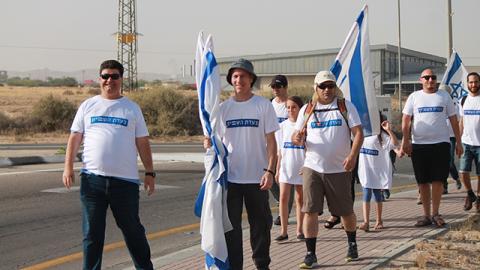Mayors march for equality
"A child who grows up in a poorer community will receive less (government) support than a child who grows up in a wealthier community. This is because the (wealthy) municipalities are able to add on to what the Ministry of Education allocates to the city, and the parents (in wealthier areas) are more likely to be able to financially support their child's education," said Hili Truper, Head of the Education Administration for the city of Yeruham and one of the leaders of the protest march.
She continued, saying that "the regions and cities which are more impoverished are unable to this, despite the fact that they would love to be able to add to the Ministries' budgets, and despite the fact that the parents would love to be able to help as well. The government must close this gap."
The "Equality March" set off from Yeruham at 7:00am with both regional council and municipal leaders alongside private citizens. They passed through Segev Shalom on their way to Kiryat Gat, Kiryat Malachi, Beit Shemesh, and will eventually end up in Jerusalem next week to set up a protest tent outside the Ministry of Finance.
"It's unacceptable that half of the citizens of Israel are systematically discriminated against," explained Yeruham Regional Council Head Michael Biton, who came up with the idea for the march. "Equal opportunities for education and equal treatment when it comes to welfare aren’t privileges. It's the government's job and the job of the government ministers to fulfill their basic obligations."
Several municipal heads have joined the march including Mayor of Bat Yam Yossi Bachar, Akko Mayor Shimon Lankri, Netivot Mayor Yehiel Zohar, Sakhnin Mayor Muazen Ghanim, Emek Hama'ayanot Regional Council Head Talal al-Karnawi, and Rahat Mayor Dr. Mohammed A-Nbari, amongst others.
"The divide between the periphery and the center is giant, and the country must bridge this divide so that every child in the periphery will have the same chance (as a child in the center) to succeed," the mayor of Akko said. He continued, saying "the strength of the country won't be measured in Tel Aviv or Hertzeliya, but in Yeruham, Akko, and Shlomi. As soon as the country begins to understand this, we will be able to create a stronger and healthier society."
"This divide is an existential threat," said Ofakim Mayor Zvika Greengold. "Dealing with this threat requires a dramatic shift to help the poorest municipalities and regional councils with various shortfalls in their budgets, in education in particular."
Tamar Tablisi Hadar

